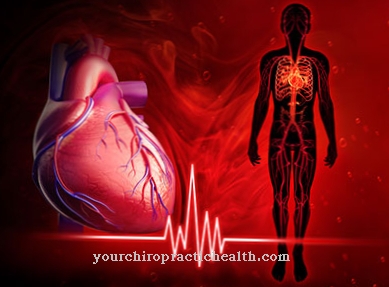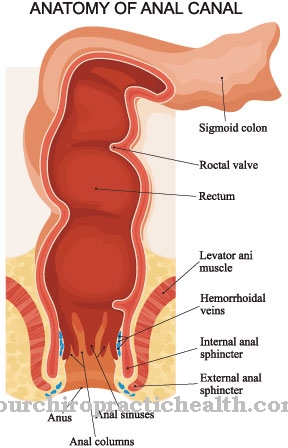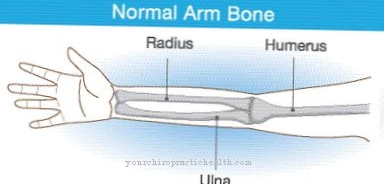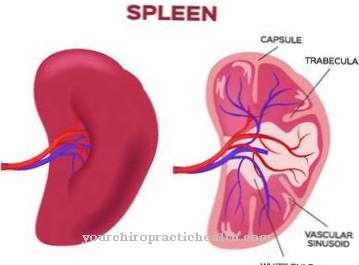Graves disease, also Graves disease called, is an autoimmune disease of the thyroid that is usually associated with an overactive thyroid (hyperthyroidism). Women are four to five times more likely to be affected by Graves' disease than men.
What is Graves Disease?
.jpg)
© bilderzwerg - stock.adobe.com
As Graves disease (Graves disease) is an autoimmune disease of the thyroid that is associated with overactive (hyperthyroidism) and inflammation of the thyroid (thyroiditis).
In Graves' disease there is an excess of the thyroid-stimulating hormone TSH (thyroid-stimulating hormone). As a result of a disruption of the immune system, the body's own antibodies against the thyroid tissue, so-called TSH receptor antibodies (TRAK), are formed, which attach to the TSH receptors on the tissue surface of the thyroid gland, stimulate an overproduction of thyroid hormones that is decoupled from the normal hormonal regulatory system and gradually cause an overactive thyroid.
Graves' disease usually manifests itself symptomatically as a goiter of varying degrees (enlarged thyroid gland), often in combination with endocrine orbitopathy (protruding eyeball) and tachycardia (rapid heartbeat).
causes
The causes for Graves disease have not yet been clarified. However, it is assumed that there is a genetic predisposition (disposition), since the disease occurs more frequently in certain families and in many cases it manifests itself together in identical twins.
Furthermore, those affected by Graves' disease have specific common genetic characteristics. It is also assumed that environmental factors, hormonal changes and stress factors influence the manifestation and course of Graves' disease. For example, pregnancy is considered a certain trigger factor, although it has not yet been conclusively proven that this is causally due to the hormonal change (changed estrogen and progesterone levels) during and after pregnancy.
In addition, infections caused by bacteria (including Yersinia enterocolitica) and viruses (including retroviruses) and excessive iodine intake are also discussed as possible triggers of Graves' disease.
Symptoms, ailments & signs
The overproduction of thyroid hormones in Graves' disease affects many body functions and can thus trigger a wide variety of complaints. A disturbed metabolism is noticeable through constant weight loss despite sufficient food intake; sweats, hot flashes and frequent bowel movements are also typical. Problems falling asleep and staying asleep as well as increased irritability indicate involvement of the vegetative nervous system.
The heartbeat can accelerate and does not slow down even at night; high blood pressure and shortness of breath can also occur. Women often suffer from menstrual disorders, as a result of which there is no menstrual period - this lowers fertility. In men, erectile dysfunction often occurs in the context of Graves' disease, and in both sexes the sensation of pleasure can be restricted.
A disorder of the bone metabolism can trigger osteoporosis, which manifests itself as a reduced bone density and an increased tendency to fracture. Muscle weakness often develops, as well as muscle pain at rest or during exercise. Occasionally an increased tremor of the hands can be observed.
Those affected often notice protruding eyes ("Basedow's bulging eyes"): In many cases, the eye changes are accompanied by a painful sensation of pressure, visual disturbances, irritation of the conjunctiva and increased sensitivity to light. Other typical signs are an enlarged thyroid gland (goiter), very warm, dry skin and excessive hair loss.
Diagnosis & course
_2.jpg)
A Graves disease can be felt using the goiter (enlarged thyroid gland). More than 50 percent of those affected by Graves' disease have endocrine orbitopathy, in which the eyes protrude as a result of inflammatory processes in the eye sockets and in the ocular fundus tissue.
In addition, a sonography (ultrasound) of the thyroid shows hypoechogenic (hypoechoic) tissue structures. A scintigraphy (nuclear medicine imaging process) can determine the increased production of thyroid hormones. In addition, a precise blood test to determine the hormone and antibody concentration serves to confirm the diagnosis and is used in differential diagnosis to differentiate Graves' disease from other autoimmune diseases of the thyroid (e.g. Hashimoto's thyroiditis).
The TRAK concentration is usually increased in people with Graves' disease. Graves' disease has a chronic course that can vary greatly from person to person and is characterized by spontaneous remissions (spontaneous healing) as well as relapses (relapse).
Complications
Graves' disease is a condition that can have complications. If the condition is not treated medically in the long term, there is a risk of heart problems such as cardiac arrhythmia or heart failure (heart failure). One of the dreaded effects of Graves' disease is the thyrotoxic crisis, which is a serious derailment of the metabolism.
Although it rarely occurs, it is a life-threatening emergency situation. The risk of a thyrotoxic crisis increases if the thyroid gland is severely overactive or if the prescribed medication is discontinued. Incorrect treatment with iodine-containing agents is also a possible cause.
The thyrotoxic crisis is initially noticeable through a racing heart, constant diarrhea, vomiting, fear and restlessness. Furthermore, high fever, impaired consciousness and disorientation can set in. In the further course there is a risk of falling into a coma, failure of the circulatory system and impairment of kidney functions.
Complications from Graves' disease are also possible during pregnancy and can occur even with appropriate therapy. It is conceivable that antibodies against the thyroid gland form within the mother's blood and also penetrate the placenta.
In such cases, there is a risk that the unborn child will produce more hormones, leading to overproduction. This threatens the child with premature birth or with too little weight at birth. In the first week of life, the baby's mortality is increased.
When should you go to the doctor?
If an unplanned and unwanted continual decrease in weight develops, a doctor should be consulted. The weight loss indicates metabolic disorders and is characteristic of Graves' disease. Sweating, hot flashes, or anxiety are signs of an existing irregularity and should be presented to a doctor so that a diagnosis can be made. Disturbances in night sleep, problems falling asleep and severe tiredness are indications of a health disagreement. A doctor's visit is necessary as soon as the symptoms persist for several days or weeks or increase in intensity. A doctor is needed in the event of irritability, behavioral problems, or mood swings.
If the person concerned suffers from a disorder of the heart rhythm, high blood pressure, muscle weakness or mobility problems, a doctor's visit is necessary. Hair loss or changes in the appearance of the skin should also be examined and treated. Increasing bone fractures are particularly worrying and should be medically clarified by further tests. If there are visual disturbances or shortness of breath, a visit to a doctor is recommended as soon as possible. There is a threat of a further deterioration in health. If sexually mature women experience disorders or irregularities in their menstrual bleeding, they should consult a doctor. Decreased libido in both sexes is another indication of impairment that should be investigated.
Treatment & Therapy
Since the causes of Graves disease are not clarified, the therapeutic measures are symptomatic and aim at the drug elimination or reduction of the hyperthyroidism.
For this purpose, anti-thyroid drugs (thiamazole, carbimazole, propylthiouracil) are used, which have an inhibiting effect on hormone synthesis and secretion or the incorporation of iodine in the hormone precursors in the thyroid gland. Long-term drug therapy usually lasts 12 to 18 months, with the dosage decreasing with the duration of therapy.
In addition, β-blockers are often used in Graves' disease to treat the accompanying symptoms (tachycardia, increased blood pressure). In some cases, this treatment results in a complete cure (40 to 70 percent). If further drug therapy is unsuccessful after a relapse (around 80 percent of relapses), definite therapeutic measures such as surgery or radioiodine therapy to remove or destroy the thyroid are possible.
In radio-iodine therapy, radioactive iodine is administered, which causes temporary radiation that is locally limited to the thyroid and causes the thyroid tissue to die. If the thyroid is greatly enlarged, it is removed as part of a surgical procedure. As a result of the radioiodine therapy and the surgical procedure, there is an underactive function that must be treated with hormones for life.
Outlook & forecast
The prognosis of Graves' disease is very different for each person affected. It can even be 50 percent of all cases that a remission occurs. This means that the symptoms of the disease often subside permanently or temporarily. However, in such cases, the disease can recur even after many years. Conservative therapy in the form of one to one and a half years of treatment leads to successful healing in around 50 percent of those affected. But this also means that about every second person affected develops a so-called relapse, this is the recurrence of the disease.
After radioiodine therapy or surgical removal of the entire thyroid gland, also known as a thyroidectomy, a definitive healing of the existing hyperthyroidism is possible in those affected. In both cases, however, patients must then take special thyroid hormones daily throughout their lives in order to achieve normal hormone levels in the body.In spite of this, 50 percent of those affected have the possibility that Graves' disease will heal on its own.
Treatment is still necessary. Because even after healing, the disease can flare up again. A thyrotoxic crisis can also occur in the course of the disease. This is a dreaded complication because it leads to death in 20 to 30 percent of cases.
prevention
As the causes of Graves disease are not clarified, the disease cannot be prevented. However, all factors that negatively affect the immune system can contribute to the manifestation of Graves' disease. These include stress and psychological stress, hormonal contraceptive methods and excessive intake of iodine (X-ray with iodine-containing contrast media, iodized salt). Nicotine consumption can also trigger Graves 'disease and worsen the course of Graves' disease.
Aftercare
Graves' disease can result in lifelong follow-up care. This is independent of the respective treatment method. In addition, eye discomfort due to endocrine orbitopathy must be prevented, which is possible in around 50 percent of all patients. In addition, follow-up treatment for Graves' disease requires a lot of effort and patience. The therapy strategies are designed for the medium to long term.
In the case of conservative drug therapy, the patient receives anti-thyroid drugs for one to two years. Depending on the initial situation, the risk of a relapse is 30 to 90 percent. Follow-up examinations must take place every four to eight weeks.
The safest and fastest treatment methods for Graves' disease are radioiodine therapy and surgery. However, following these procedures, it is necessary to take thyroid hormones for the rest of life. This is the only way to compensate for the resulting underactive thyroid, i.e. a deficiency in thyroid hormones. If regular check-ups are necessary at the beginning, these are limited to one or two examinations per year in the further course.
Immediately after surgery on the thyroid gland, the patient is given a standard amount of thyroid hormones. How many hormones the patient ultimately needs is determined in the period after the operation and adjusted accordingly. The target values vary and are determined by the family doctor or an endocrinologist.
You can do that yourself
In the case of Graves' disease, there are some measures that the person affected can take to improve their quality of life. At the beginning there is the certainty after the diagnosis that you will be physically and emotionally stressed during the treatment period. There are self-help groups for those affected by Graves' disease and other opportunities for discussion. These opportunities for discussion can be particularly valuable if Graves' disease has already led to physically visible symptoms.
The emotional burdens and stress can be reduced by creating targeted free spaces and relaxation techniques. Since it is an autoimmune disease, the condition of the person affected has a not insignificant influence on the course of the disease. Food containing iodine should be avoided in order not to put additional strain on the thyroid. The same applies to dietary supplements that contain iodine. This can slow down the course of the disease and possibly have a beneficial effect on therapy.
With regard to possible involvement of the eyes, it is important to protect them from strong stimuli. This means avoiding strong sunlight, cold wind, drafts and so on as much as possible. Since Graves' disease can take very different courses and is quite common, it is also valuable to find out more about the condition. This often enables better management of the disease and its treatment.
























.jpg)



